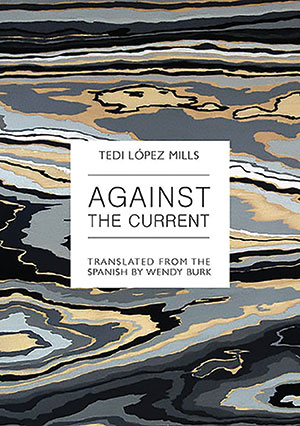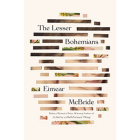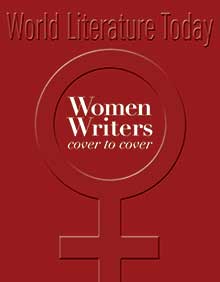Against the Current by Tedi López Mills
 Los Angeles. Phoneme Media. 2016. 80 pages.
Los Angeles. Phoneme Media. 2016. 80 pages.
In a Drunken Boat interview by Rebecca Seiferle, Mexican poet and translator Tedi López Mills states, “I don’t know if it pertains to the more ‘personal’ streak in American poetry or rather to concretion, to direct experience. Our tradition, which comes to us in part by way of France, is more abstract: fixed metaphor, understanding through analogies.” It is true that Against the Current is metaphorical and analogical; it is also deeply informed by ecopoetics, philosophy, and critical theory. In this collection, abstractions and analogy are grounded in—arise from—strong concrete and natural imagery, with rivers serving as the guiding metaphor.
The collection, an en face edition of Mills’s Spanish originals with scintillating translations by NEA translation fellowship-awardee Wendy Burk, is “baroque,” as both the poet and the translator note, in the sense that it employs lush, imagistic, layered, and often-paradoxical language: “my grey post with its trifling halo, my crust of light on the street, what gnat lets slip its war within the chiaroscuro circle cracked down the middle, creeps toward the puddle of motor oil."
The poems, structured as an abecedarian sequence, are prose poems composed as cumulative, and sometimes periodic, sentences that may take inspiration from, and are reminiscent of, a combination of influences as varied and wide-ranging as European Enlightenment syntax, Whitman’s multitudes, Silliman’s “New Sentence,” continental philosophical treatises, contemporary theories of the subject in relation to the social, and Pablo Neruda. The initiating question of the collection is perhaps found in poem “Q,” where, “insists H.,” the primary conundrum is “aporia or entelechy, let the lady choose.” The trajectory of the collection addresses the question of who the speaker is, what does she know, and how might that knowledge be represented: “my habitual phrase: once more I don’t know what I know."
Throughout the book, the poet-speaker persona defines herself against / with / in relation to her “brother,” the Other, the “entity who expresses me in being.” He first appears in the “C” poem as an “island” and is identified by at least fifty different adjectives by the end of the book: “invisible watcher,” “senseless, reticent,” “precarious, artificial,” “pensive,” “iconoclastic,” “sensitive,” and more. The brother, whom Mills has identified as her “real” brother, is also an analogical brother. “I am not what I am, he says,” and neither is the poetic speaker.
Moreover, questions of representation and interpretation, of being and nonbeing—artists’ and philosophers’ questions—arise in many forms, as in the following passage: “ah, how the world tempts us, leonine light drinking from the streamlet, unaware of the poorly described hole or in what person I return, bringing my burden back, just what I began with, an object unsheltered, chalky hill that doesn’t exist until I perceive it, captive in a certain phrase . . .” Readers will also discover many politically charged moments in Against the Current, for example, “tell me now if the poverty I have seen is a makeshift enclosure or a custom” and: “but did the mind exist beyond the facts, was it dark, were there bones, a politics of ornament, for sale, for free, gift or compensation, never seeing how it was, by way of the corpse, by way of a law laughably postponed.”
Given the ecological and sociological tendencies in the collection, one might ask, “Is Mills’s poetry a political poetry?” If “political poetry” is equated with “polemical poetry,” which Thomas McGrath identified as “tactical” poetry,” the answer is no. If political poetry can be strategic, then Mills’s Against the Current is a political collection: “I also thought we needed another kind of poetry that is not keyed necessarily to immediate events, a poetry in which the writer trusts himself enough to write about whatever comes along, with the assumption that what he is doing will be, in the long run, useful, consciousness raising, or enriching. A strategic poetry, let’s say” (McGrath, North Dakota Quarterly, 1982).
Tedi López Mills’s strategic collection Against the Current asks many questions; it offers no easy answers. “But anyone who reads it will have his consciousness expanded by the reading of it . . .” (McGrath).
Jeanetta Calhoun Mish
Oklahoma City University
Get the book on Amazon or add it to your Goodreads reading list.
More Reviews
-
-
-
-
-
-
-
-
-
-
-
-
-
-
-
-
-
-
-
Eva Sleeps by Francesca Melandri
Francesca Melandri. Trans. Katherine Gregor -
-
-
-
-
-
-
-
Umami by Laia Jufresa
Laia Jufresa. Trans. Sophie Hughes -
-
-
-
-
-
-






































